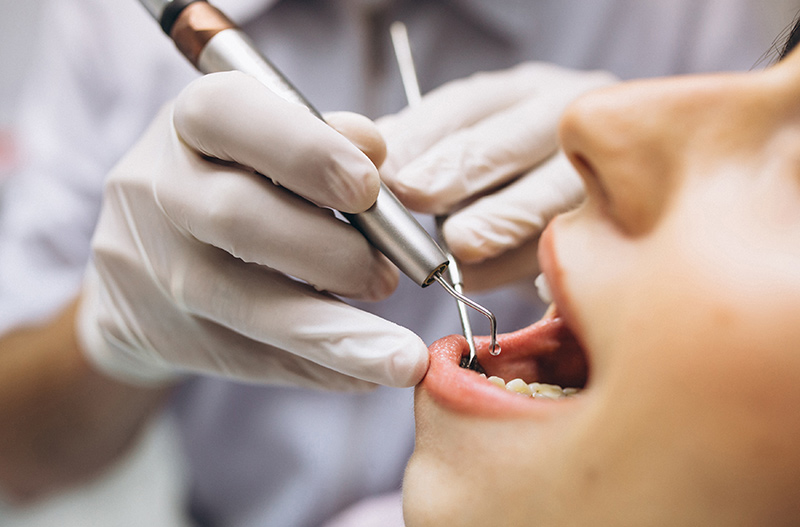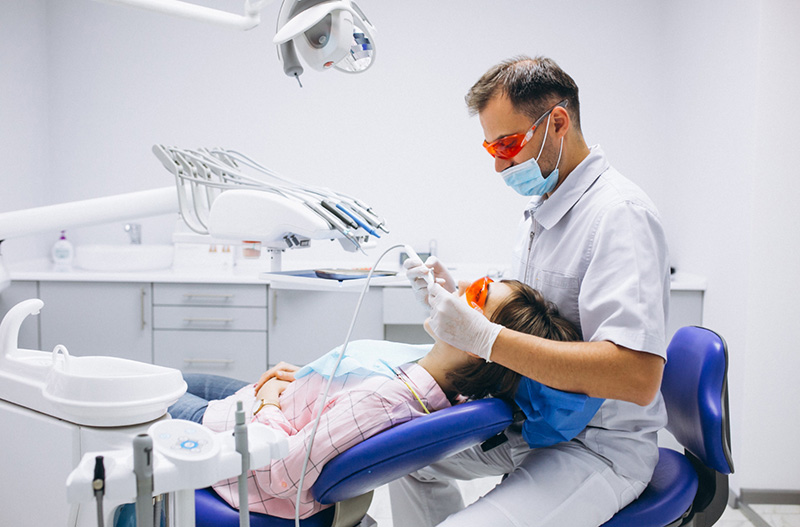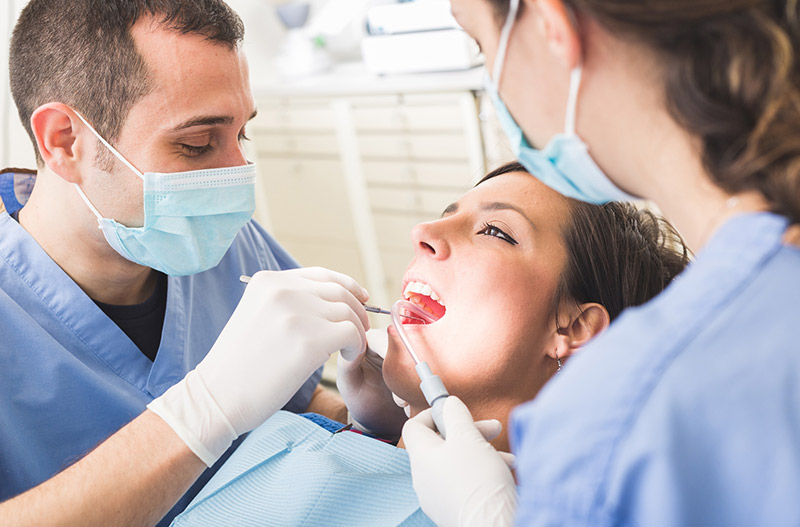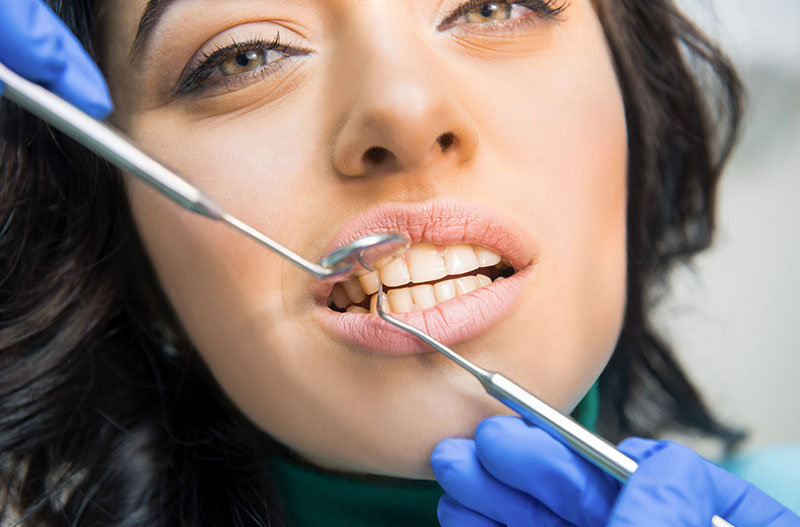Sunday, May 1st, 2022

Oral hygiene is one of those areas that most people find easy to neglect. However, a little effort up front goes a long way toward preventing cavities, gum disease, and other issues that are, unfortunately, quite common. As you review the list below, don't hesitate to get proactive and start implementing preventive solutions as soon as possible.
Sensitive teeth can be painful, and they can also end up having a significant impact on which foods you are able to eat. If you've noticed that your teeth have become sensitive to sugary foods, then it's time to put away the candy and get more disciplined with your diet. Drinking icy water, hot coffee, or hot tea can also trigger sensitive teeth.
While sensitive teeth can be a symptom of many underlying conditions, gum issues are among the most common causes. Brushing your teeth too aggressively can cause gums to recede, but so can normal aging. If you've already eliminated bothersome foods and checked your brushing habits, then the next step may be to come in for a checkup.
Buildup of tartar and plaque on the gums can cause gingivitis, and gingivitis can lead to painful inflammation. When gingivitis progresses without treatment, it can turn into a serious condition known as periodontitis. Fortunately, it's easy to catch gingivitis early.
Common symptoms include discoloration around the gum line or swollen and sensitive gums. In addition to brushing your teeth once in the morning and once in the evening, flossing regularly also provides a solid defense against gingivitis.
When many people think of dental problems, cavities are what immediately come to mind. However, it's more accurate to think of tooth decay as a process. If decay is able to set in and start damaging a tooth's enamel, then eventually it will eventually begin damaging that tooth's root unless treated. Like gum disease, tooth decay isn't difficult to prevent. Brushing, flossing, and scheduling regular dental appointments can certainly help you avoid pesky cavities and stay away from costly dental surgery.
Most often, an infected root is the result of untreated tooth decay. As suggested by its painful nature, a root infection is an emergency situation. As the infection progresses, you may notice swelling in your checks, sore gums, pain in your jaw, and even swelling of the lymph nodes. The best way to prevent a root infection is to follow our advice for preventing cavities and gum disease.
This is the only common problem on this list that isn't necessarily due to poor dental hygiene. Through no fault of your own, an unfortunate accident can result in missing teeth. Regardless of the cause, however, it's important to replace a missing tooth as soon as possible. Fortunately, we offer dental implant services that can help.
The problems listed above are all preventable or treatable if you take the time to monitor your oral health and form proper habits. To book an appointment with a Coquitlam dentist, contact us today.
Friday, April 1st, 2022

According to the CDC, 47% of American adults over 30 struggle with gum disease. That number jumps to 70% of adults over age 65. It may be the most common diagnosis made at a dental checkup.
In its early stages, gum disease (gingivitis) makes gums swell with inflammation, which can hurt and cause bleeding. As it worsens, patients can lose their teeth. Most urgently, gum disease can expose patients to serious infections that damage the bones, lungs, and even the heart.
Fortunately, there are preventative measures and treatments—including deep cleaning. It's wise to talk to your local dentist in Coquitlam, BC, to learn what treatment options are right for you.
That said, there are some broad guidelines to explore if you're wondering, "When does gum disease require deep cleaning?" Read on to learn about the stages of gum disease, and how deep cleaning works to help.
Gum disease starts with oral bacteria. Ideally, you'll be able to prevent gum disease before it ever happens. Oral hygiene is key to prevention.
That said, it's important to intervene as early as possible if you have it.
The best preventative measures are to brush and floss your teeth at least twice a day, and to see a dentist once or twice each year. It's wise to see a dentist more often if you're at higher risk of gum disease. Medications that cause dry mouth, hormonal treatments, and stress can elevate your risk.
If your risk is high, you can use mouthwash in addition to brushing and flossing.
Studies have demonstrated certain mouthwashes can further decrease the risk of gum disease. These can also help treat gum disease by reducing its severity. According to one recent analysis, the most effective mouthwashes typically include one or more of these ingredients:
Other studies have demonstrated the efficacy of Aloe vera as a mouthwash ingredient. It can improve dental health and soothe irritated tissue at the same time.
If you have early-stage gum disease, or your disease's severity is mild to moderate, a deep cleaning is the right treatment. Deep cleaning is scaling and root planing. Typically, dentists use local anesthetics, like novocaine, so the treatment is painless.
During a deep cleaning, the dentist uses manual and electric tools to remove the plaque from teeth. The process specifically removes plaque deposits that form in deep pockets of the gums. The deposits are the primary source of the germs that cause gum disease.
Deep cleaning pulls the gums from the roots of the teeth. After deep cleaning, the dentist will smooth out the roots, which encourages the gums to re-attach to the roots.
Dentists may prescribe an aftercare regimen after the deep cleaning is complete. This can involve prescription-strength toothpaste and mouthwash. You may be asked to avoid certain foods.
Once gum disease has progressed and become severe, a deep cleaning may not be enough. At this stage, you may have already lost teeth and experience severe pain. A dentist will generally prescribe oral antibiotics to get the bacterial infection under control.
Once antibiotics start working, it's possible deep cleaning is still an option. But, more often, clinicians must address severe gum disease with debridement.
In some cases, debridement cannot be safely performed in a dentist office. This is an oral surgery that removes damaged or diseased tissue.
Dentists treat the most serious cases with gingivectomy or gingivoplasty surgeries. This removes diseased gum tissue and shapes healthy gum tissue.
Catch gum disease early with a dentist you trust. Get your next dental checkup right here, from a dentist in Coquitlam. Book an appointment by phone, or contact us online today.
Friday, October 1st, 2021

Have you ever spit your toothpaste into the sink and saw it streaked pink? Or, looked in the mirror after brushing and noticed one of your gums bleeding? Most of those reading this will likely answer yes.
That's because almost everyone will experience bleeding gums at least once in their life. So while the sudden sight of blood can be alarming, you should not be concerned if it only happens once.
However, bleeding gums are sometimes a symptom of more serious issues. If you are concerned about your inflamed gums, then continue reading to learn the causes of bleeding gums, treating gum disease, and how to prevent it.
These gum disorders are the top causes of bleeding gums.
The main difference between them is that your dentist can resolve your gingivitis, but if you are a periodontal patient, you are a periodontal patient for life. That's because, with gum disease, you can slow the progression of the condition, but you can't eliminate it.
Unfortunately, if left untreated, gingivitis will progress to periodontal disease.
Gum disease causes gum recession, tooth loss, and eventual loss of jaw bone. So, if you live in British Columbia and experience bleeding gums, finding a gum disease treatment dentist in Coquitlam should be your priority.
Sometimes the cause of bleeding gums is as simple as a brand new toothbrush. Stiff bristles paired with a heavy hand might be wreaking havoc on your soft, delicate gum tissue.
If you just started flossing, you may experience sensitive gums or bleeding the first go-around. Once you incorporate flossing into your hygiene routine, you should not experience any more bleeding. When bleeding becomes consistent, it's time to visit your dentist.
You should always keep your dentist in the loop of your overall health and medications because your dentist will tell you if the medications you're on might impact your oral health.
For example, blood thinners can cause bleeding gums because they make you more prone to bleeding.
So at your next appointment, bring a list of medications with you so that you and your dentist can optimize your dental care plan.
Several lifestyle factors can cause gum disease symptoms to arise.
Even a short lapse in oral hygiene can have consequences. Suppose you stay up too late on the weekends that you fall asleep without brushing or flossing. In that case, you can develop gum disease, even if you have stellar habits throughout the week.
Those that smoke are also risk of periodontal disease. This is because smoking inhibits healing making you more vulnerable to gum infections.
If you suffer from bleeding gums, you should visit your dentist for gum disease treatment as soon as possible to bring your mouth back to good health.
Studies have proven that stress is tied to higher rates of gum disease. Scientists suspect that stress related inflammation changes the way your mouth responds to bacteria.
When you're stressed, improving gum health is the last thing on your mind. However, bleeding gums are often a sign of a severe problem, so you should you contact your dentist right away.
There are several benign causes of bleeding gums, but you shouldn't assume that they apply to you. The only way to be sure of the cause of bleeding is to visit a professional dental office and have a thorough examination.
The first step to exceptional oral health is to find a trusted dental home. Brookmere Dental Group is a gum disease treatment dentist in Coquitlam with 20 years of experience.
Contact us today to begin your journey to a healthy smile.
Thursday, July 1st, 2021

Is your smile "toothier" than normal? Have you noticed any differences in the gum line on your teeth? If so, you might need receding gums treatment.
Receding gums occur for many reasons, one of which is poor dental hygiene. The gum tissue pulls away from the tooth, thus creating gaps between the tooth and gum line for bacteria to thrive. This leads to tooth loss.
The first sign to look out for is tooth sensitivity. The recession of the gum line is slow, so if you don't visit the dentist on a regular basis, you won't know until it's too late. If you think your gums are receding, schedule an appointment with Brookmere Dental Group for gum disease treatment.
Need more guidance? Keep reading for information you need to know.
There are many reasons why your gum line is receding. Aside from poor oral hygiene, genetics, lifestyle, and age are factors. Some lifestyle factors are:
If you notice your gums are swollen, red, or bleeding with ease, go see a dentist. These are signs you might have gum disease.
The first course of receding gum line treatment is antibiotics. Antibiotics are the best to prescribe when the infection is a mild case. Other medications are antimicrobial mouthwash, enzyme suppressants, antiseptic chips, and topical antibiotic gel.
There are three types of surgeries to treat your receding gum line: regeneration, scaling and grafting. Surgical procedures are performed when the disease has worsened.
This procedure is to regenerate bone destroyed from the recession of the gum line. Your dentist folds the gum tissue back to expose and remove bacteria. Afterward, they place a membrane, a graft tissue, or a tissue-stimulating protein as the regenerative material.
This encourages the body to regenerate the bone and tissue. The gum tissue is placed back over the tooth to protect its roots and protect the regenerative material.
This procedure is like the regeneration technique. This is a deep cleaning treatment where the dentist cleans plaque and tartar away from the surface of the tooth as well as the root.
In scaling or root planning, the dentist folds back the inflamed gum tissue to remove the harmful bacteria from the gaps. After, the dentist secures the gum tissue over the tooth to reduce the size of the gaps caused by the gum line receding.
The purpose of this procedure is to revive the gum tissues or the bones of the tooth. The dentist places a synthetic particle or piece of bone or tissue to help the gums grow back. This procedure isn't long-term unless you exercise proper oral hygiene.
Based on the severity of your case, the dentist will decide the type of grafting necessary. A connective tissue graft is when a piece of skin is cut at the roof of your mouth and sewn to the gum tissue surrounding the exposed root.
A free gingival graft is when tissue is taken from the roof of your mouth instead of under the skin. If you have enough gum tissue around the affected tooth, your dentist may graft from there instead of your palate. This is referred to as a pedicle graft.
Gum disease treatment doesn't reverse the process of gum recession but it does slow down the process. After getting treatment for your gums, exercise good oral hygiene to prevent the disease from spreading further. What's the point of getting treatment if you don't change your habits?
Set up appointments with your dentist at least twice a year while keeping an eye on your teeth and gum line. Brush your teeth with a soft-bristled or electric toothbrush and floss every day. Follow the instructions your dentist tells you for the best results.
Receding gum lines are preventable when you get gum disease treatment and exercise good oral hygiene. Your gums are going to be pink when you schedule an appointment with us at Brookmere Dental Group.
Whether you're a new patient or established, we got you for your dental needs.
